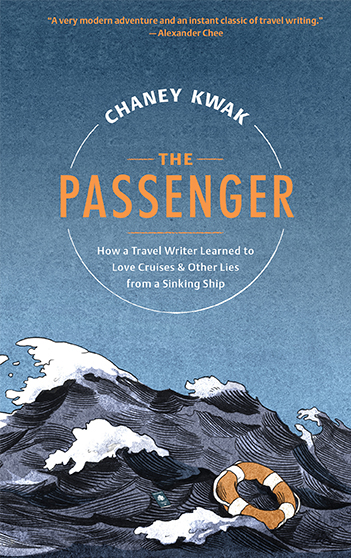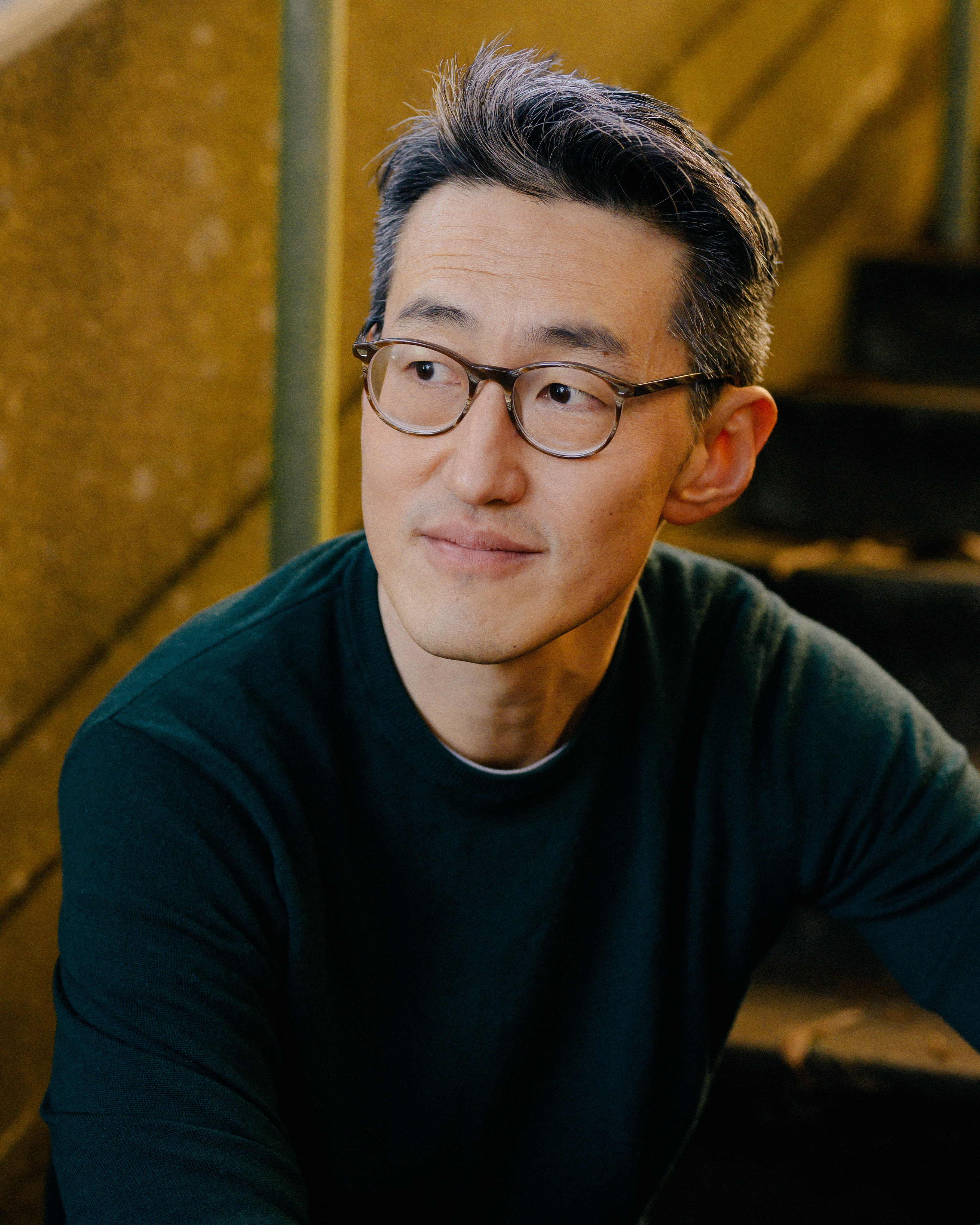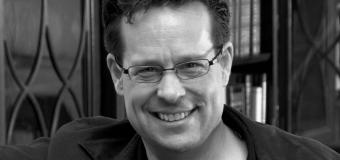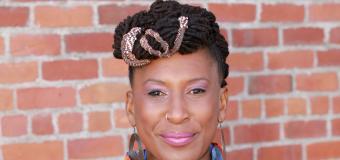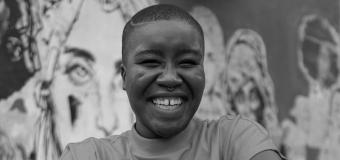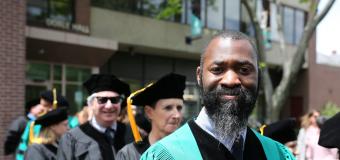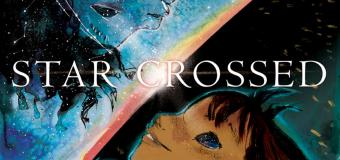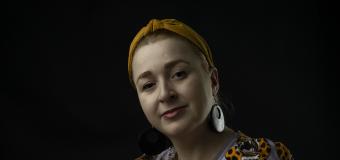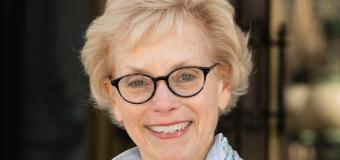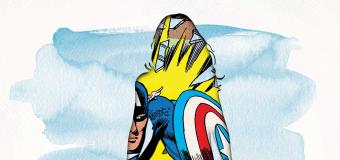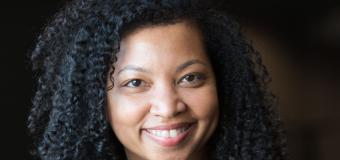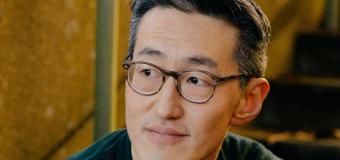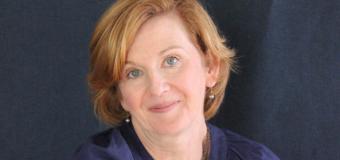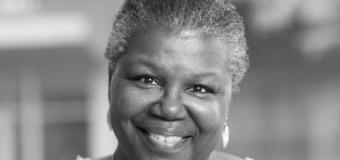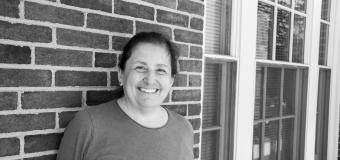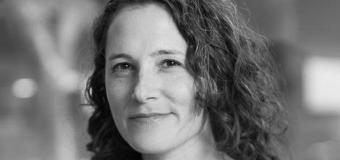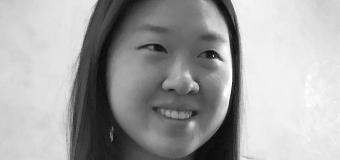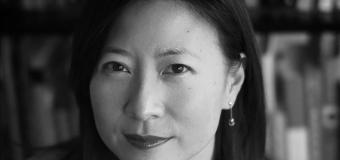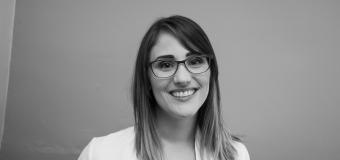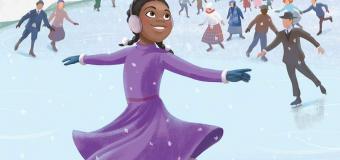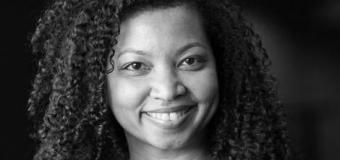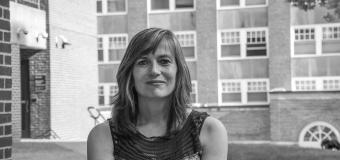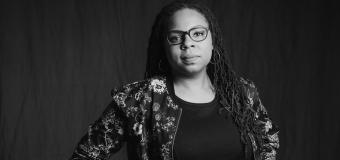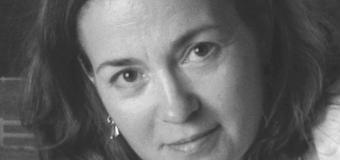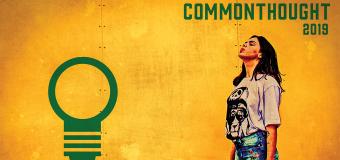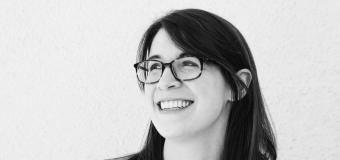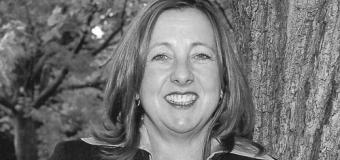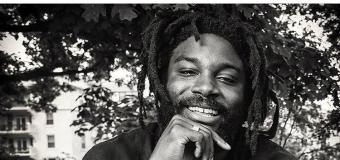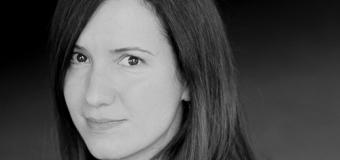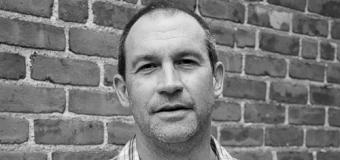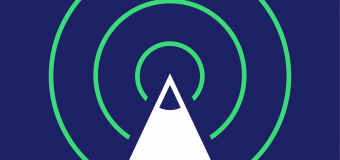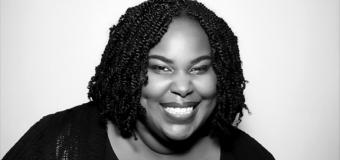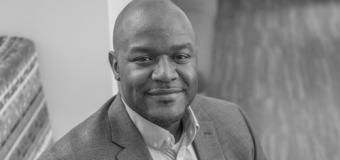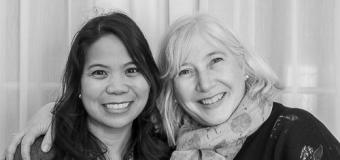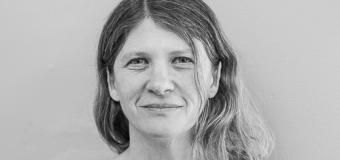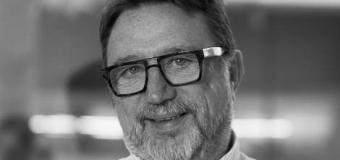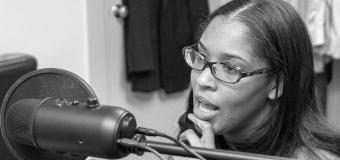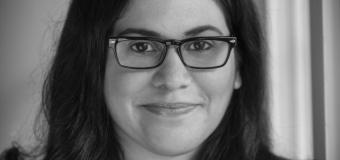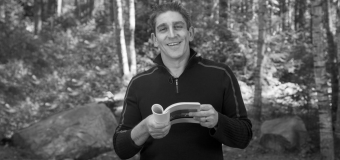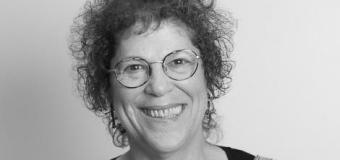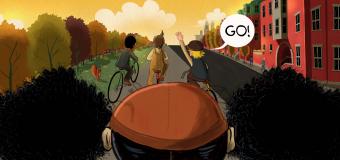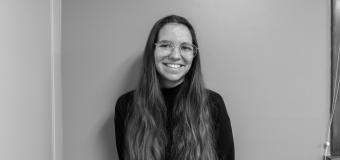Narrator (Michael Procopio): “The book’s about being stuck,” I hear myself say. “Actually, it’s more about trying to change course when things go south. And about the randomness of fate. It feels embarrassingly melodramatic, because I get pretty confessional…but, god forbid, I hope the memoir doesn’t sound me-moi-me-moi-me-moi. Oh I also interview a bunch of people and write from their perspectives, which of course makes me feel like a fraud….”
Georgia Sparling: This is Why We Write, a podcast of Lesley University. Every episode, we bring you conversations with authors from the Lesley community to talk about books, writing and the writing life.
Hi, everybody. I'm Georgia Sparling, and today I'm speaking with Chaney Kwak. Chaney graduated from our MFA in Creative Writing program with a focus on fiction. But today we're going to be talking about his first book, and it's called "The Passenger: How a Travel Writer Learned to Love Cruises & Other Lies from a Sinking Ship." It's a memoir, travelogue and adventure tale about the time a Norwegian cruise ship was on the brink of capsizing while the world watched and, of course, commented.
If you're a regular listener, you'll notice you've got a slightly different format today. There were so many quippy and quotable lines in "The Passenger" that I wanted to share with you. So I've got some sprinkled throughout our interview and read by voice actor and fellow Lesley employee, Michael Procopio, who you also heard at the top of the show. Okay, here's my interview with Chaney Kwak.
So Chaney, welcome to the show. I'm really glad to have you here
Chaney Kwak: Thank you for having me.
Georgia: So first, I want to start off talking about how you found yourself on a Norwegian cruise ship that seemed like it might capsize.
Narrator (Michael Procopio): "I’ve approached every cruise I’ve taken like Margaret Mead visiting Papua New Guinea: the most foreign of environments that grows somehow more alien each time I inhabit it."
Chaney: So I actually have gone on a lot of cruises, but I don't like them that much. I work as a travel writer, and like all other freelancers, I say yes to most assignments that come my way. And somehow I seem to end up with a lot of cruise assignments. In March 2019, I was going to go on two cruises back to back actually for two different magazines. And that's how I found myself in March. In Norway.
Narrator (Michael Procopio): "I have confided in my closest friends – but even then, only in passing and with vague references – that I want to write books. After more than a decade of doing this, I have very little to show for myself: a handful of short stories in literary magazines and countless abandoned projects."
Georgia: You said that you had been trying to write books for a while, but this is the first one that you've finished or the first one you're getting published. So how did you end up writing about this particular circumstance or crisis, I guess?
Chaney: This was never meant to be a book, to be honest. I went on the cruise to write a feature story for a magazine, the cruise ended up having a catastrophic engine failure, and the assignment was killed. And I just kind of went on with my life. After that cruise was kind of a turning point in my life. And after about a year or so, I started kind of scribbling things about the cruise and what I thought was an essay became slightly longer than what I could place in a magazine anywhere. And then when I showed it to a friend, he said that he felt that this was a book rather than an essay, and that's how we ended up being my first book to be published.
Narrator (Michael Procopio): "When I’m away — on assignment like this, for instance — I know breaking up is the only right thing to do. But when I return home and see Hannes, I lose all resolve. We’ve long lost our attraction to one another, yet this is the sleight of hand humans have named love, this queer mix of muscle memory and personal history that binds two people together, sometimes despite their best efforts."
Georgia: It is a fairly short book, like I think somebody could read it in an evening, but a lot is happening. Like there's the action of the moment and, you know, like things sliding around deck and that kind of stuff. But you're also talking a lot about like all these emotions that are kind of roiling inside of you. And I was really struck by how honest and vulnerable you were, especially about your relationship at the time with a man named Hannes who, that's a pseudonym, but why expose yourself in this way?
Chaney: That's a good question. I asked myself that every day [laughs]. I'm a deeply personal, very private person. And I just thought like talking about myself and-- why did I do this? When I started writing about the incident, which is that in the middle of a storm with 80+ plus mile per hour wind, this cruise ship carrying 1,393 people lost all its power. And we were basically at the mercy of the sea. And spoiler alert, nobody dies.
Georgia: Thankfully.
Chaney: Thankfully. And I was just writing it thinking, "Well, what is the point of it all? Why was this incident so significant in my life? For someone who doesn't really like cruises, or someone who travels for a living, why was this particular trip so significant?"
Because it was a turning point for me, and I had a lot of realizations about myself, my relationship, my family, and my writing life as well, examining what it was about writing a book that I really wanted. So it couldn't have been a complete story without that personal angle. And at first, I only wrote about the incident and my family history, which itself felt really personal, but my editor felt really strongly that not talking about my relationship, in a life or death situation was just incomplete. And he turned out to be right.
I do think that talking about my relationship, failing relationship, made the book more even though Hannes, which is like you said is a pseudonym for my ex, even though he occupies maybe 10% of the book, if that, I think that relationship is actually the central point of the book.
Georgia: In the moment, how much of this are you thinking? I mean, because you do call him, I think, a couple of times, or you messaged him as well. Were you thinking at the time? Like, maybe this is it for us?
Chaney: This is it for us in…?
Georgia: …like in your relationship?
Chaney: Sure, I mean, at first, I thought this is it for my life.
Georgia: Yeah.
Chaney: There were moments when I think the passengers genuinely thought that it was going to end in a very different way. Especially when, when the ship was breached, then water started flowing in, I think people started kind of thinking of how it's, well, you know, what are the odds here?
In terms of the relationship? Sure. I mean, but I'd been thinking about that. I think before getting on that ship, I just wasn't willing to admit it.
Georgia: I'd just say like, in that part, I was really struck by how vulnerable you were about that, but also about your family, and how close you seem to them. And just one passage where you were talking about going on a trip with your mom, and how she'd had breast cancer and a mastectomy. She was complaining about being hot, and you're like, "why are you wearing this long sleeve shirt or whatever, black shirt, through New Zealand?" And you realize it was because she was kind of covering up. I almost started crying because I thought that was such a sweet moment of tenderness with her. And when you were writing these things, like did you feel like "I'm gonna have to run this by my mom and dad or by Hannes?"
Chaney: Yeah, I mean, that's the tricky part in writing a memoir, I suppose. I've never studied nonfiction in a formal setting. I don't know actually what the right thing is. I did run the story by my mom. And it's actually based on a magazine assignment that I got after her mastectomy. I write about that in the book. That's, that should happen. Because I had an assignment. I pitched it as a trip with her and she was delighted. And she saw the finished product as well. Again, I come from very private stock.
You know, it's deeply uncomfortable for us, but my parents definitely support me and understand that those parts were an essential foundation for the book because I could take one route and say, "Hey, there was this cruise, I was on it. We almost died. We didn't. Yay." Or write a book that felt like had more at stake for me and I hope for the readers, and that involves becoming a lot more vulnerable and personal. So it's a deeply uncomfortable place. But here we are.
Narrator (Michael Procopio): "Then my heart sinks. I see tweets of 'thoughts and prayers, 'Americanese for resignation and inaction. That’s when you know you’re royally fucked."
Georgia: Transitioning a little bit, you talk about how you definitely have some disdain for the social media bystanders. And as all of this is happening, you're able to check Twitter and see that there's a travel blogger who's talking about "Well, look, I had this great experience on this ship, which is owned by the same company." I mean, just kind of appalling while people are potentially about to capsize into the ocean.
Chaney: Yeah, I think social media does bring out the best and the worst. Yes.
Georgia: [laughs] Definitely. As you were writing the book, how did you want to present what happened such that it wouldn't end up being kind of this like voyeurism that you see sometimes on social media?
Chaney: I mean, I'm struggling with it a lot to be honest, even now. And I finished writing quite a while ago. How do you go beyond that kind of sensationalist tweet or headline? And going personal, I think was one way to do that, because this story belongs to me. Because it comes from my own personal experience on this. And also, I interviewed rescue workers for the manuscript, and got to see things from their points of view.
I tried to downplay the more salacious parts, I suppose, of the accidents because, you know, what ended up happening was that it turned out, according to the Accident Investigation Board of Norway, low engine oil was the problem and that's how the engine shut down, all those things. But I didn't want to dwell on those. And as you read the book, you'll see that even though it starts off as a story about a cruise accident, it turns into something entirely different.
Narrator (Michael Procopio): "A voice on the speaker, which by now I have come to associate with a semi-omniscient and wholly unhelpful deity, returns. We shush one another."
Georgia: I want to put in a side note that the book is not all doom and gloom. There's a lot of really funny moments, and you have some really funny lines in there. Anyway, the book is written on a timeline over the course of this kind of misadventure. So how did you go about reconstructing what happened? Because I imagine you weren't sitting there on the floor, looking at your watch and writing down what people said.
Chaney: Yeah, so timestamping, everything was my editor's idea. And I think it helps the reader kind of ground themselves in the narrative. I was lucky that I was writing about an event that was really covered extensively in real time, so that I had literally hundreds of articles, I could go back and cross check all the events. And there were a lot of contradictory things out there, actually. But I was able to reconstruct the timeline based on how things were being reported at the time. And also with with the accident investigation report put out by the region, investigative board.
Georgia: Is there anything surprising or any revelations, as you were interviewing people for the story?
Chaney: Yeah, quite a bit. One was that we really did come very close to danger, more so than we were aware at the time. There's a lot of video footage of the ship being very close to shore, which is never a good idea because they're not meant to be on firm ground. And, I mean, there are a lot of factors in there. What surprised me the most I think, is the fact that there were hundreds of people who stayed on overnights, they're all to make sure that we were safe. And we were safe because of them. But despite their effort, it could have gone the opposite direction. And really, it was a matter of luck at the time.
Georgia: So will you ever get on a cruise ship again?
Chaney: No. [laughs] I've always been fortunate. To be honest, I've always been very ambivalent about cruises. There's a lot about them that don't sit well with me. The fact that, you know, the kind of inequality in the world becomes so concentrated in one place, that it becomes a microcosm of all the different kinds of disparities in the world. And granted, it's not that the cruise industry treated them, right. But when you're on a ship, and you see the literal upstairs-downstairs dynamic, and even within the crew members, there's a hierarchy from people who are seen to people who are kept out of sight. Those things were always kind of very difficult for me, in addition to that kind of environmental problems that they leave behind, combined with my not so great last experience, I would say I am not planning on going on a cruise anytime soon.
Georgia: So yeah, let's talk about your travel writing. So you studied fiction at Lesley. But what got you into travel writing?
Chaney: You know, I actually was doing it before starting my MFA program. The reason why I came to Lesley was to study with Michael Lowenthal and that was fantastic. And I suppose you can say I'm still an aspiring fiction writer because my first book is a book of nonfiction. And it's something that I always thought I was doing for a living and not necessarily something I was really, and I cringe saying the word, but something I'm passionate about per se. But I think this particular journey describing "The Passenger" was a turning point of sorts, too. I think I appreciate nonfiction writing and travel writing more than before.
Narrator (Michael Procopio): "I’ve grown jaded beyond repair after a decade of carouselling in the freelance trade. It no longer thrilled me to see my name in publications I’d revered. I was constantly chasing assignments, then running after the editors all over again to get paid. I used to put up with all the hassle for the sheer joy of seeing the world. These days, assignments felt less like travel and more like procrastination before I’d start my real grown-up life."
Georgia: So by the time that as you're saying, like by the time you're on this cruise ship, you are pretty dissatisfied it sounded like with travel writing and you know, cruise ships are a particular hell for you. How do you feel about travel writing now, like after a year plus, because of COVID, without being able to travel?
Chaney: Right. Well, for one, I miss it. I love traveling like everybody else. It's a privilege to be able to move freely. And I think I've come to appreciate that more than ever .Having written something so personal. I don't know, if I could necessarily go back to writing something that's semi-personal, you know. There's service oriented travel journalism, which is basically go here, go there, you know, this is how to do it, that kind of stuff. And then there's also personal stuff where it's in the first person and this is the epiphany I had kind of stuff. But "The Passenger" is more personal than even that. I'm not sure if I can do that any time again soon, to be honest, because I'm putting myself out there with "The Passenger." And it's like you said, I'm putting myself in a very vulnerable position. And I have no idea how this is going to play out.
Georgia: Do you think you're done with travel writing? Or is there more of that in your future?
Chaney: I hope there's more. But the travel media, I mean, the magazine industry's been pretty much decimated in the last few years, especially. COVID has not been great. And I'm not sure actually what that's gonna look like. I'm not going to turn into an influencer anytime soon. That's for sure. [laughs]
Georgia: Like you said, the travel writing industry, if you want to call it an industry, has been really hurt by just how publishing has changed. And you know, in the book kind of you seem to note like a difference between travel writers for magazines versus these influencers and travel bloggers. So, is there still a place for travel writing in the world do you think? And do you have advice for people who want to try it?
Chaney: Will travel writing still exist? I mean, for sure, yeah. People will continue to chronicle what they see, what they do, and most importantly, what they feel and how they change on the road. Many people will be doing that on social media, and that's fine. And there's going to be also people who are going to be doing that through writing.
How that goes out into the world? I'm not so sure. You look at magazines and realize that they're a third of the size they used to be, you know. A feature used to be thousands of words and now I'm lucky to get 1,000 words. And on top of that, how do you write about travel when we've been cooped up for months? What does it even mean to write about travel when the freedom of movement has been such a privilege, has been for a long time, but more so than ever now?
I've always believed that you can do travel writing about places that are really close to you. The most compelling travel writing can take place in your local strip mall. It's more than just, you know, I did this, I did that, I ate this and that, I did this. It's always been about your own take on your experience, and also how they connect to the rest of the world.
After the pandemic, I think there's going to be such an overload of stimuli. I think there will be a lot more people who don't take travel for granted. And that's great for travel writing. But if they want to publish that, I'm not sure where that's going to end up. Travel blogs used to seem like the next big thing that turned out to be not the answer. And who knows, maybe all these influencers with perfect bodies might also fade away.
Georgia: Maybe. We can only hope. [laughs] So what does writing look like for you these days? What kind of stuff are you focusing on?
Chaney: Very inconsistent, and especially with "The Passenger" coming out in June, but I am working on a couple of different projects. But it seems really random to me what ends up being completed and what doesn't. So we'll see.
Georgia: Yeah, is writing still your full-time gig? Or are you pursuing other things?
Chaney: It's not. During the pandemic, I ended up getting a writing job, corporate writing job. And it's interesting, because after I got off the cruise, I got my first corporate job of my life in my 20s and 30s, like what seemed to me like, I don't know, something I really wanted to avoid, suddenly became envious. After that cruise disaster that I went through, I just wanted some stability, and especially trying to leave the relationship that I was in. I'm finding it really interesting to be starting a corporate job for the first time and having this experience that most people have when they're 21, 22. But I wrote "The Passenger" in the morning, actually before going to work. And I wrote every morning, and those were the happiest hours of my work day at the time. So I'm trying to recreate that now. But it's not easy.
Georgia: Yeah. This podcast is called "Why We Write," so why do you write?
Chaney: I was really dreading you asking that question, because I knew you were going to.
Georgia: Well, you were warned. [laughs]
Chaney: [laughs] And to be quite honest, I don't think I actually enjoy writing.
Georgia: It's hard.
Chaney: It's hard. It's painful. Yeah, I don't enjoy writing. But I enjoy having written and there are really rare moments when writing does go well, and there's no other feeling like that. When I was completing "The Passenger" there are some placeholders in the book. And the editor was very lenient with me, but you know, we came we were getting closer and closer to the deadline and those placeholders were still just placeholders, I knew exactly what I wanted to say I just couldn't do it. And then on one evening, I was sitting outside, and I started writing those parts, and everything just clicked. And in moments like that you just feel really infinite. Maybe that sounds corny, but that's how it feels to me. And, I wish those moments happened more frequently. But you know, they do sometimes. And that's, I guess what I'm chasing. Unfortunately, 99% of the time, I really don't.
Georgia: [laughs]Honestly, I think you're probably in good company with other authors in the world on that point. One last question. So once countries do open back up to the US and we're vaccinated and whatnot, where is the first place that you want to go?
Chaney: Well, Turkey was the last place I went to before, was the last big international trip I made and might be a nice bookend, I think, to the pandemic.
Georgia: Someday.
Chaney: Someday.
Georgia: Well, thank you so much for talking to me. This was a great conversation, and I really I really enjoyed the book. And honestly, I also really love the cover.
Chaney: Thank you, Georgia. Thanks for having me.
Georgia: Thanks. Thank you so much for listening to why we write you can pre order Chaney's debut, "The Passenger: How a Travel Writer Learned to Love Cruises & Other Lies from a Sinking Ship" at bookshop.org or anywhere books are sold. If you want to know more about Chaney, check out the link in our show notes. And as always, we'd love it if you would rate and review us on Apple podcasts. It helps other people to find the show.
